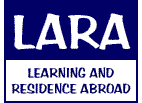

What is an ethnography programme and why is it worth introducing it into the curriculum?
This ethnography programme is based on the idea that students will get the most out of their period of residence abroad if they take a leaf out of the anthropologists' book and undertake an ethnographic project. 'Ethnography' is the study of another group's way of life from their perspective. It is the fundamental method of anthropologists who seek to understand the cultural practices of others, whether that means going to a small atoll in the Pacific or studying how people re-design their kitchens on a London housing estate.
The rationale for developing language learners as ethnographers is to offer a systematic and rigorous approach to cultural and intercultural learning. Students learn new ways of looking at the ordinary and the everyday, drawing out patterns from careful and extended observation of a small group, e.g. students have studied dancers of the Sevillano dance in bars in southern Spain, blind students in Marburg University, Germany and the Carnivaliers in Nice. Spending time 'lurking and soaking' in a particular environment or with a group helps students develop an insider perspective on cultural processes and immerses them in the language of the group.
The ethnography programme consists of:
The programme is, therefore, well integrated into the whole degree course. By giving students a full module before they go abroad, they can relate the habits of observation, reflexivity, challenging of stereotypes and close analysis of data to other aspects of their course, and can prepare themselves intellectually for the experience abroad. Once there, they are strongly motivated to get out and find a group who can be their informants rather than waiting until near the end of their stay and relying largely on book-based learning. On their return, the process of writing up engages them in thinking about their own culturally-based judgements and in relating the cultural learning abroad to the re-integration into their home environment.
Writing an ethnographic project is the best way that we can think of for assessing the notoriously slippery area of cultural learning. The written project should provide evidence that the students have acquired cultural knowledge and can write about their own learning in an analytical way. The process of doing ethnography (even if it cannot all be displayed in the project itself) is equally important in giving the opportunity for a sustained and rigorous exercise in cultural learning.
Colleagues often comment that the idea of ethnography is a good one but it is difficult to offer a whole new unit or module in the curriculum and would a few workshops do? Our experience is that students need a considerable amount of time to learn new ways of looking at the everyday if they are to have the confidence to do an ethnographic study. Also, the whole programme is designed to integrate as fully as possible the learning while abroad with the curriculum both before and after the period of residence abroad. So, including the ethnography programme is an opportunity to add a significant new dimension to the curriculum and not just tinker with it.